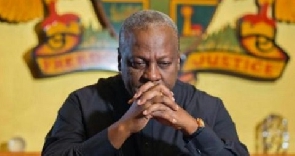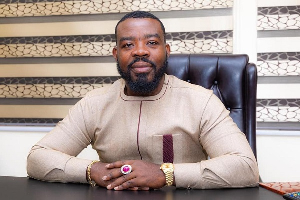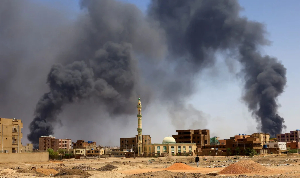Ghana’s Finance Minister Ken Ofori-Atta has said the country’s status as one of the fastest-growing economies in the world is not “primarily” due to her oil sector.
Presenting the 2020 budget statement to Parliament on Wednesday, 13 November 2019, Mr Ofori-Atta said: “Mr Speaker, for the last two years (2018 and 2019), Ghana has been amongst the fastest-growing economies in the world! Ghana’s recent growth has not been primarily driven by oil; it has been more broad-based”.
In fact, he said, “Non-oil GDP has increased from 4.6% in 2016 to 6.5% in 2018 and is projected to reach 6.0% in 2019 and 6.7% in 2020, respectively, reflecting the impact of our flagship programmes”.
The Finance Minister’s comment comes a few weeks after former President John Mahama claimed credit for the achievement and attributed it to his government’s works in the oil sector.
According to him, the Akufo-Addo government did nothing toward that achievement but only reaping from the previous administration's "hard work".
A World Bank Report recently named Ghana among the four fastest-growing economies in Africa. The other African countries include Ethiopia, Rwanda and Cote d’Ivoire.
Ghana and the three others are currently growing at seven per cent.
"Africa still hosts four of the fastest-growing economies in the world. Countries such as Ethiopia, Rwanda, Ghana and Cote d'Ivoire are still growing above seven per cent. These countries are not only the growth champions on the continent but also among the fastest-growing economies in the world", the Chief Economist for Africa at the World Bank, Dr Albert Zeufack, made this known from the World Bank Report in a live video conference streamed from Washington, DC, USA, in early October this year.
video=85186>
He was speaking at the launch of the 20th edition of the Africa Pulse Report, the World Bank's twice-yearly economic update for sub-Saharan African.
"So, overall, we do have 10 economies in Africa that are still growing above six per cent, but it is also important to highlight the three largest economies in Africa — Nigeria, South Africa and Angola — which are still having extreme difficulty recovering from the recession they experienced over the past two years. Excluding these three economies, the rest of Africa is growing around four per cent", he said.
Speaking on the matter at a meeting with party leaders and supporters in the UK, Mr Mahama, who is the flag bearer of the main opposition National Democratic Congress (NDC), said the growth achievement which is being "trumpeted" by the Akufo-Addo government, came about as a result of his administration's sterling performance in office before the current government took over.
"Whatever is responsible for the growth, the growth is only in the oil sector", Mr Mahama said, adding: "All that growth, fastest-growing economy in the world, it's the oil sector".
"And where are those revenues coming from?" he asked.
"They are from the TEN field and the Sankofa field that we worked on in our time", he answered.
"And that made me, in 2016, say that Ghana was going to be the fastest-growing economy in the world and that we are going to grow above eight per cent. I predicted it before they came into office", Mr Mahama noted.
"And, so, you [Akufo-Addo government] come into office – we were receiving less than a billion cedis in revenue from oil – and because of TEN and Sankofa, you're receiving almost GHS4 billion in revenue; four times what we got. And then we introduced ESLA and you were so much against ESLA and said when you come, you’ll repeal it; ESLA is bringing GHS3 billion more revenue than what we got.
"And, so, you're seeing growth based on those revenues, you didn’t introduce them, you’re just the beneficiary of the hard work that the previous government did. And yet, that's what they are trumpeting: the fastest-growing economy. It cannot be by accident. Yes, it is not by accident because we worked just to make it happen", the former President told his audience.
Mr Speaker, the increased economic growth has been the result of increased agricultural and industrial output. As a result of the successful Planting for Food and Jobs Program, agricultural GDP growth has increased from 2.9 per cent in 2016 to 4.8 per cent in 2018 and projected to reach 6.4 per cent in 2019. It is heartening to note that unlike in the past, Ghana has not had to import maize for food consumption in the last two years. Industry has also seen a recovery with industry growth increasing from 4.3 per cent in 2016 to 10.6 per cent in 2018, and projected to grow by 8.8 per cent in 2019. This is real change.
However, Mr Ofori-Atta told Parliament that the economy is healthy today because of the good policies of the Akufo-Addo government.
“Mr Speaker, the restoration and sustainability of macroeconomic stability has been a cornerstone of the economic policy of President Akufo-Addo’s government”, adding: “Without macroeconomic stability, all the goals that we have set for ourselves as a country will not be achieved”.
“As a demonstration of our commitment to macroeconomic stability, we have pursued a policy of fiscal discipline which we have supported with the passage of the Fiscal Responsibility Act, 2018 (Act 982) (that limits the fiscal deficit in any year to 5% of GDP) and the establishment of a Fiscal Council.
“Mr Speaker, the fiscal deficit (on cash basis) has significantly fallen from 6.5% of GDP in 2016 to 4.5% of GDP in September 2019. For the first time in a decade, Ghana recorded primary surpluses (that is our tax revenues exceeded all government spending—excluding debt service payments) for two years in a row. That is real change!”
General News of Wednesday, 13 November 2019
Source: classfmonline.com
Oil not driver of Ghana’s fastest-growing economy status – Ofori-Atta to Mahama
Entertainment












